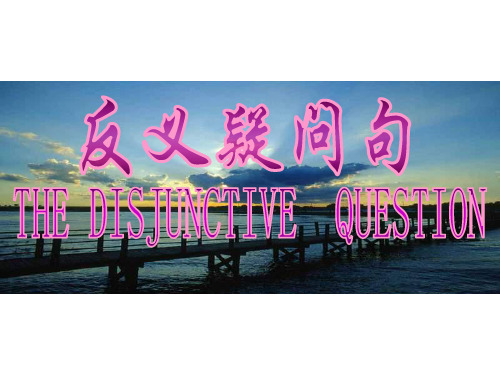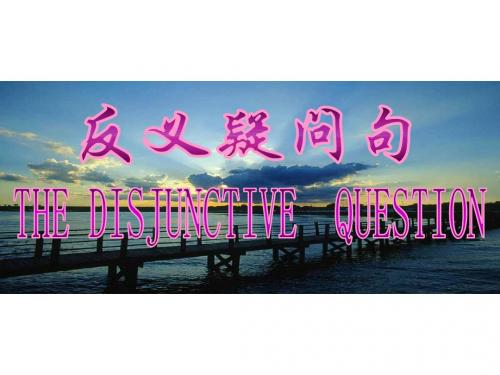高考英语重点语法复习-反义疑问句
- 格式:doc
- 大小:191.00 KB
- 文档页数:8


高考英语反义疑问句用法反义疑问句是英语语法中的一种特殊句式,由一个陈述句和一个相反的疑问句组成。
这种句式通常用于询问对方的意见或确认陈述的正确性。
在高考英语中,反义疑问句的用法较为常见,我们需要掌握其基本结构和正确使用方法。
本文将详细介绍高考英语中反义疑问句的用法及相应的例句。
一、反义疑问句的基本结构反义疑问句主要由两部分组成:陈述部分和疑问部分。
陈述部分是对某个事实或观点的陈述,而疑问部分则是对该陈述的相反观点的疑问。
陈述部分的谓语动词通常是行为动词、状态动词或助动词。
当谓语动词是行为动词或状态动词时,疑问部分的谓语动词通常使用助动词“do”或“does”。
当谓语动词是助动词时,疑问部分的谓语动词通常使用原来的助动词。
二、反义疑问句的使用方法1. 肯定陈述 + 否定疑问当陈述部分是肯定句时,疑问部分使用否定形式的疑问句。
例如:He is a student, isn't he?他是一个学生,不是吗?2. 否定陈述 + 肯定疑问当陈述部分是否定句时,疑问部分使用肯定形式的疑问句。
例如:She doesn't speak French, does she?她不会说法语,对吗?3. 陈述部分有实义动词如果陈述部分有实义动词(非助动词),则疑问部分使用助动词“do”或“does”。
例如:They like playing basketball, don't they?他们喜欢打篮球,对吗?4. 陈述部分有助动词如果陈述部分有助动词,则疑问部分使用原来的助动词。
例如:You can swim, can't you?你会游泳,对吗?5. 以let's开头的陈述句以let's开头的陈述句,疑问部分使用shall we。
例如:Let's go to the park, shall we?我们去公园吧,好吗?三、高考英语中的应用示例1. 完成句子The weather is nice today, ________?天气今天不错,是吗?2. 完成句子Tom isn't coming to the party, ________?汤姆不来参加聚会,是吗?3. 完成句子She will never forget this experience, ________?她永远不会忘记这个经历,对吗?4. 完成句子They have already finished their homework, ________?他们已经完成作业了,是吗?5. 完成句子Let's study harder for the exam, ________?让我们更努力地为考试学习,好吗?总结:反义疑问句是高考英语中的常见语法现象,掌握好其基本结构和正确使用方法对于理解和运用该句式非常重要。



高考英语语法专讲:反义疑问句一.概念反意疑问句是附加在陈述句之后,对陈述句所表示的事实或观点提出疑问的句子.附加疑问实际上是一种简略的一般疑问句.二.相关知识点精讲1.反意疑问句的结构:陈述句(主语+谓语……),+助动词/情态动词/be动词+主语(代词形式)?说明:陈述句部分如果是肯定句,反意疑问句,疑问句部分的助动词/情态动词/be动词+not (否定提问);如果陈述句部分是否定句,反意疑问句,疑问句部分用肯定式提问。
例句:He is your teacher, isn’t he?People shouldn’t drop litter on the pavements, should they?You foun d the key in the bedroom, didn’t you?They have a house in town, haven’t they? /don’t they?The boy has to clean his room, doesn’t he?I am right, aren’t I?They’d rather go by bus, wouldn’t they?You’d better change your wet skirt, hadn’t you?He’d like to join our discussion, wouldn’t he?She ought to see a doctor at once, shouldn’t she? / oughtn’t she?I wish to s ay a few words, may I?That’s nice, isn’t it?This i s the place, isn’t it?Everybody knows the answer, don’t they?Nothing is serious, isn’t it?T here wasn’t enough time at that moment, was there?There used to a tower here, usedn’t there? / didn’t there?What you need is more practice, isn’t it?2.某些特殊句型的反意疑问句:1)祈使句的反意疑问句:表示肯定意义的祈使句,即表示“请求,提示”它的反意疑问句用will you 表达:有时也可以用won’t you 表示。

反意疑问句一、见解反义疑问句 (The Disjunctive Question)即附加疑问句,反意疑问句是疑问句的一种,是对陈述句所说的事实或见解提出疑问,起证明作用,一般用于证实说话者所说的事实或见解。
反意疑问句是由陈述句和附在以后的附加疑问句组成。
结构有以下两种:1.陈述部分必定式 +疑问部分否定式2.陈述部分否定式 +疑问部分必定式即:前肯后否,前否后肯。
反义疑问部分用助动词或神情动词或be 动词+名词或代词(主格)。
如: They work hare, don’t they?She was ill yesterday, wasn’t she?You didn ’t go, did you?He can’t ride a bike, can he?二、反义疑问句的用法1. 陈述部分主语是I 的必定形式时,疑问部分要用aren ’t I.如: I ’m as tall as your sister,aren’t I?2.陈述部分含有否定词或半否定词,以及含有由否定意义的词的反意疑问句当陈述部分有 never ,seldom, hardly ,few,little ,barely, scarcely, nothing ,nobody 等否定词或半否定词时,反意疑问部分用必定形式。
否定前缀不能够视为否定词,其反意疑问句仍用否定形式。
如: There are few apples in the basket, are there?He can hardly swim, can he?They seldom come late, do they?It is impossible, isn't it?He is not unkind to his classmates, is he?3、含有宾语从句的反意疑问句当陈述部分是一个(带that引导宾语从句的)主从复合句时,附加疑问句的主谓要和主句的主谓保持对应关系。
语法:反义疑问句与倒装句详解反意疑问句和倒装句一、反意疑问句(disjunctive questions/ tag questions)1.前一句是肯定句,后面要用否定问句;前面是否定句,包括句子里带有否定意义的词如never, seldom, hardly, scarcely, rarely, few, little, no, nothing, none 等,后面要用肯定问句。
eg. He has made few friends in his class, has he?You seldom meet with this kind of matter, do you?She said nothing at the meeting, did she?但是要注意,impossible, dissatisfy, uncomfortable这类词不是否定词。
eg. He is impossible to finish the work by himself, isn’t he?The result of the maths exam dissatisfied yo u, didn’t it?You failed to pass the test, didn’t you?2.前后的人称要一致,但后面的问句中只能用代词,不能用名词。
如果前面的主语是everything, anything, something,nothing那么在问句中用it作主语;如果前面是everyone, everybody, no one, nobody, someone, somebody, anyone, anybody, those, all(指人)等词作主语,那么后面问句可以用he或者they作主语,现在用they 更加普遍。
eg. Everything is ready, isn’t it?Nothing can prevent him from working, can it?Everyone in the village knew the man, didn’t they/ he?如果是there be的句型,那么后面的问句就用引导词there。
高考英语重点语法复习-反义疑问句-CAL-FENGHAI-(2020YEAR-YICAI)_JINGBIAN反义疑问句反义疑问句(The Disjunctive Question)又叫附加疑问句(Tag Question)。
在口语中,反义疑问句用于发起谈话、询问信息或是礼貌的请求别人去做某件事。
反义疑问句由两部分组成:前一部分是一个陈述句,后一部分是一个简短的疑问句,两部分的人称时态应保持一致。
总体规则一、反义疑问句的语调1、在说话人知道问题的答案,使用反义疑问句表示请求赞同时,后面的反义疑问句部分用降调。
That film was fantastic, wasn't it ↘2、在说话人不明确问题的答案,使用反义疑问句表示说话人需要核实信息时,后面的反义疑问句部分用升调。
You don't know where the boss is, do you ↗二、反意疑问句中的对应规则:1、反意疑问句中问句部分的谓语动词与陈述部分的谓语动词在语气上成相反的对应关系,即:肯定+否定否定+肯定?①You can’t do it, can you?②They are very late for the meeting, aren’t they?2、反意疑问句中问句部分的动词与陈述部分的动词种类要对应一致。
如:①He has supper at home every day, doesn’t he (不能用hasn’t he)②They have known the matter, haven’t they (不能用don’t they)3、反意疑问句中问句部分的动词在时态上应和陈述部分的时态一致。
如:①They will go to town soon, won’t they (不能用don’t they或aren’t they)②He works very hard, doesn’t he (不能用didn’t he或won’t he)注:当陈述部分是I think 加从句时,疑问句应和从句的人称时态保持一致。
I think chickens can swim, can’t they?I think Lucy is a good girl, isn’t she?I didn't think he was happy, was he?2三、反义疑问句中主语变化规则4、陈述部分的主语是everybody, everyone, someone, no one, nobody, somebody 等合成词或词组时,反意疑问句部分的主语在非正式文体中,往往用they,有时也用he;而当陈述部分的主语是指示代词或不定代词this, that, everything, nothing, something 等时,反意疑问句部分的主语用it。
①Everyone is ready for the experiment, aren’t they (isn’t he)② Neither side can win, can they (can he)5、当陈述部分以one不定代词做主语时,附加问句的主语在正式常场用one或you,非正式场合用he。
One should always be ready to help those in trouble, shouldn’t one/you 每个人都应该随时准备帮助那些有困难的人,是吗One must serve the people heart and soul, mustn't he 每个人都必须要全心全意为人们服务,不应该吗6、当陈述部分的主语是不定式、动名词、从句、this或that,反义疑问句的主语用it。
(是those, these则用they)① To learn English well is quite bene ficial to our future, isn’t it?②Developing a good habit is very important for us students to learn our lessons well, isn’t it③That he doesn’t work very hard makes his parents worried, doesn’t it?④This is important, isn’t it?⑤That isn’t correct, is it?⑥These are your friends Tom and Jack, aren’t they?37、当陈述部分的主语是表示物的不定代词everything, anything, nothing等,反义疑问句的主语用 it。
So mething is wrong with your notebook, isn’t it 你的笔记本电脑坏了,是吗8、陈述部分的主语是none of…时,反义疑问句部分的主语应与of后的名词或代词保持一致。
① None of the students went there, did they?② None of the dish smells good, does it?四、反义疑问句部分肯定和否定形式的判断规则9、陈述部分带有否定词或半否定词,例如:barely, few, little, never, hardly, scarcely, seldom, no, none, no one, rarely, nowhere, nothing, nobody, few, little等,反义疑问句的动词要用肯定形式。
① There are few apples in the basket, are there?② He can hardly swim, can he?③ They seldom come late, do they?10、如果陈述部分中的否定词仅带有否定的前缀或后缀,此类词不属于否定词,那么该陈述句应作肯定句处理,反义疑问句应用否定形式。
①Your father is unhappy, isn’t he(不能用is he)②The man is dishonest, isn’t he (不能用is he)③It is impossible to learn English without remembering more words, isn’t it(不能用is it )常见句型的反意疑问句11、当陈述部分是there be 存在句型时,反义疑问句的主语也用there。
①There’s no help for it, is there4②There’s something wrong, isn’t there?12、感叹句的反义疑问句,其谓语要求用否定句。
①What a clever boy, isn’t he?②How exciting the game is, isn’t it13、祈使句后面的反义疑问句问题1) 祈使句是否定形式,反义疑问句只能用will you。
Let us stop to rest, will you?2) 祈使句是肯定形式,反义疑问句用肯定、否定均可。
Give me some cigarettes, will you/ won’t you3) Let开头的祈使句要注意:(1). Let’s 在意义上包含谈话的对方在内,表示提出建议或征求对方意见,其反意疑问句往往用shall we。
Let’s have a basketball match this afternoon, shall we(2). Let us在意义上一般不包含谈话的对方在内,表示请求对方允许做某事的含义,let 有allow的意思。
附加疑问部分用will you。
Let us go out for a rest, will you?(3). Let me开头表示请求,反义疑问句用will you,或用may I。
Let me have a try, will you/may I?复合句的反意疑问句14、当陈述部分是一个(带that引导宾语从句的)主从复合句时,反义疑问句的主谓要和主句的主谓保持对应关系。
但是,当陈述部分的主语是:I suppose, I think, I believe, I imagine, I expect等结构时,反义疑问句的主语和谓语要和从句的主语,谓语保持一致关系。
而且要注意到否定的转移问题。
①I don’t think that you can do it, can you (不用do I)②We don’t believe that the news is true, is it (不用do we)5③I don’t think that you can do it, can you (不用do I)④ We don’t believe that the news is true, is it(不用do we)15、当陈述部分是I’m sure that,;we are sure;I’m afraid that;We are sure that;I feel sure that 等后面跟宾语从句时,反意疑问句与后面的宾语从句一致。
①I’m sure that you will succeed in passing the exam, won’t you?②I’m afraid that John can’t go now, can he?16、当陈述部分是并列句时,反义疑问句的主谓语要和离它最近的句子的主谓保持对应关系。
Xiao Lin has been writing letters all afternoon but he should finish them now, shouldn’t he?17、强调句或类似的句型结构的反义疑问句和句首的It is/ was保持一致。
① It was last Sunday that he went to Beijing, wasn’t it?②It is five years since he joined the army, isn’t it?关于情态动词的反意疑问句18、陈述部分中有have一词,且表示“所有”含义时,反义疑问句部分既可用have也可用do。
They have no time to visit the museum, do they?19、陈述部分中有have to,反义疑问句部分用do。
I had to finish my homework, didn’t I20、含有ought to 的反意疑问句,陈述部分是肯定的,疑问部分用shouldn't/oughtn't +主语。